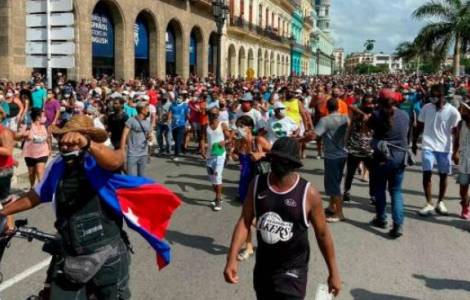Solidarity with the Cuban people due to the difficult social situation they are experiencing continues to be expressed at different levels, reported Fides News Agency.
At the July 28, 2021, Angelus, Pope Francis, who visited the island twice (2015 and 2016), exhorted after the Marian prayer:
“I am also near to the dear Cuban people in these difficult moments, in particular to those families suffering the most. I pray that the Lord might help the nation construct a society that is more and more just and fraternal through peace, dialogue and solidarity. I urge all Cubans to entrust themselves to the maternal protection of the Virgin Mary of Charity of Cobre. She will accompany them on this journey”.
Peace, dialogue, and solidarity are the wishes of many Latin American Bishops’ Conferences, dioceses, and Catholic groups, which express their solidarity with the Cuban people. In Mexico, the editorial of Desde la Fe, a publication of the archdiocese of the capital, informed: “Thousands of Cubans, from many cities, took to the streets to express their discontent over the terrible economic, social and health situation that Cuba is experiencing”, reads the note sent to Fides, “the Bishops have recognized the right of the population to raise their voices”. The Statement of the Cuban Bishops in the aftermath of the demonstrations on Sunday, July 11 is a strong sign of the tireless presence of the Church which needs our listening, our help, and above all our prayer, underlines the editorial. The Cuban people, who right now are also suffering from a virulent Covid-19 infection, without vaccines, without medicines, and with collapsed hospitals, should be an appeal to all Christians in the world, in this situation of chaos, violence, and incitement to the division by the same government. For the Spanish religious, many of whom have been missionaries in Cuba, “that Church, silent for years, has been able to remain in the heart of the Cuban people, in front of whom it has a credibility and a respect that does not exist in other democratic countries of the so-called First World, in countries with a deep-rooted Catholic tradition”, reads a comment released by social media and sent to Fides by the Spanish Vida Religiosa. “Today the Cuban Church – continues the text – is aware of being the only institution present on the island with the capacity and moral strength to say a word capable of reorienting the dictatorial situation in which its people have lived since the mid-twentieth century”.
The Cuban Episcopate is aging and tired, three Bishops have already resigned from their office for reasons of age but, incomprehensibly, they have not yet been replaced. The average age in the Episcopate is close to or above 70 years old, the youngest is 60 years old. “While waiting for a renewal with young Cuban Bishops, the Church continues to be a unique presence of hope and reconciliation, in a people who are broken, wounded, deprived of the most basic food, of any type of medicine, in precarious health and a depressing educational system, with a political system where there is no freedom of expression, there is no political pluralism, and where human rights are systematically violated”. The Archbishop of the diocese of Santiago de Cuba, Mgr. Dionisio García, yesterday asked in his Sunday homily that the existing differences on the island are to be resolved by peaceful means and “never with violence and intolerance”. “The Bishops in the midst of the difficulties, the protests, the demonstrations of these days, the prisoners, the repressions, want to pray for all Cubans, throughout Cuba”, said Mgr. García at his first mass celebrated after the anti-government protests that have shaken several cities on the island a week ago. At the National Shrine of the Virgen de la Caridad del Cobre, “Patroness of Cuba”, today’s requests are “above all so that there is no violence so that the logical differences that exist in each country are resolved with dialogue, mercy and forgiveness, never with violence and intolerance”.
The Archbishop of Santiago stressed that the Catholic hierarchy of the Caribbean country has invoked the need to make “changes that give hope and trust to our people, who need to feel respected every time they want to express their way of feeling and seeing our realities”. He also referred to changes that help Cubans “plan a better future and personal good for their family, and this is to the benefit of the nation”. Archbishop García, member of the Standing Committee of the Conference of Catholic Bishops of Cuba (COCC), also prayed that in the midst of the current health crisis due to the Covid-19 pandemic, patients and doctors who treat them can do so in the best necessary conditions, and for everyone’s responsibility in this situation. The protests on Sunday, July 11, the strongest recorded in Cuba in the last sixty years, occurred with the country immersed in a serious economic and health situation, with the increase in Covid infections, in addition to a serious shortage of food and medicine, to the cut of the internet service and even to power outages.
So far the protests have left one dead, several injured and more than 100 arrested.










